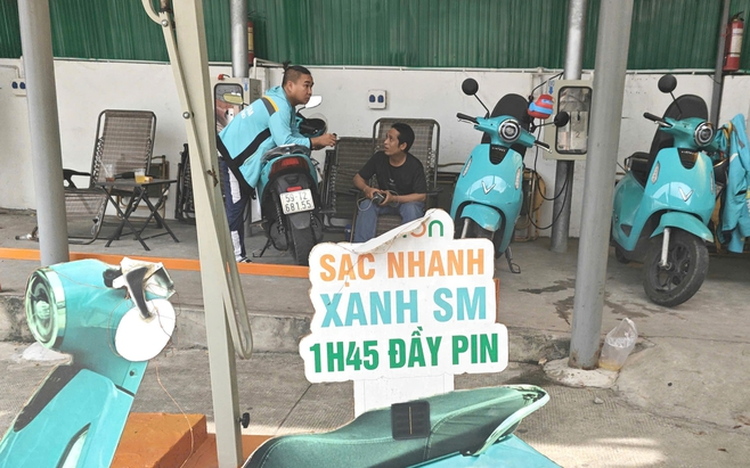
Drivers wait to charge their electric motorbikes at a café-cum-charging station in Ho Chi Minh City, August 6, 2025. Photo: Cong Trung / Tuoi Tre
But experts caution that without clear regulations, technical standards, and a road map to convert these improvised setups into officially licensed charging stations, the model poses long-term safety and sustainability risks.
Around noon on Wednesday, at a café near the Lai Thieu toll station, nearly a dozen ride-hailing drivers lounged in hammocks while their bikes were charging just outside.
Charging stations often boast little more than a few outlets mounted to their walls.
In some cafés, billiard tables have been removed to make space for four or five charging poles.
"Every café around here offers charging now. If I'm out working and the battery gets low, I just pull over, grab a drink, and charge while I rest," said Dat, a 28-year-old driver.
Many of these locations are unbranded.
Most offer little beyond power outlets, a fan or two, basic chargers, and a few packets of instant noodles.
Still, they are increasingly common throughout the city.
Since mid-2024, hundreds of these budget charging points have emerged—first in wards like Binh Tri Dong A, An Nhon, and Binh Thanh, and along National Highways 1 and 13.
More recently, they have spread into cafés and near delivery transfer hubs, where demand is especially high.
A Tuoi Tre (Youth) survey found that slow charging through a standard outlet typically costs VND20,000–25,000 (US$0.8–1) per session.
Some places bundle drink service, charging, and a rest spot—either a hammock or air-conditioned room—for VND45,000–60,000 ($1.7–2.3).
A full setup requires no special signage or equipment—just high-capacity outlets, a few chargers, decent Wi-Fi, some benches or hammocks, and light refreshments.
Phuong, who runs a café in Linh Xuan Ward, said it began with just a few drivers asking to charge.
After seeing more return, she upgraded her wiring, added more outlets, and installed basic fire prevention equipment.
Now, charging services make up 70 percent of her income, with 10-25 sessions per day, especially around lunchtime and early evening.
"With rates between VND20,000 [$0.8] and VND60,000 [$2.3] per session, this brings in stable income for small business owners like us," she said.
Beyond cafés, some households have opened their ground floors to accommodate charging needs, seeing steady traffic throughout the day.
Safety concerns
Drivers say it is often hard to find official charging stations.
Networks run by VinFast or Selex Motors tend to be located at shopping centers or fixed points with limited convenience.
"Now I can just stop at a roadside café and charge while I nap. It's super convenient," said Thanh Hoang, a driver in Go Vap Ward.
This growing demand has led to a new hybrid model: an informal rest stop that doubles as a charging station.
Total investment for a basic site ranges from several million dong up to VND100 million ($3,817), café owners report.
Adding fast DC chargers can raise that to VND200–300 million ($7,635–11,453), while standard AC chargers cost VND7–16 million ($267–610) and take three to seven hours for a full charge.
DC fast chargers, by contrast, cost up to VND350 million ($13,356) and cut charge times to 30–60 minutes.
But safety remains a major concern. Most setups still rely on residential power systems—thin wiring, extension cords, no overload protection, no circuit separation, and no current limiters.
A charging installation expert warned that without basic safety infrastructure, even a minor short circuit could cause panic or fire.
"Many of these places use exposed wiring and household outlets that haven't been inspected. The systems are cobbled together and don't meet any technical standards," he said.
Experts agree these low-cost charging points should be treated as temporary solutions.
Long-term viability will depend on establishing clear rules about who can operate stations, how they are built, and how they are supervised.
Automated battery-swapping stations
Selex Motors is expanding a more structured model: automated battery-swapping stations for electric motorbikes.
With more than 90 active locations across Ho Chi Minh City, Hanoi, and Da Nang, each station features 19 battery slots, a touchscreen interface, and IP67-certified lithium-ion batteries—water-resistant, dust-resistant, and protected against overheating and overvoltage.
All technology, from design to operation, was developed by Vietnamese engineers.
Selex Motors says its system is designed to be compatible with other EV brands, making future partnerships easier.
Ho Chi Minh City begins planning charging network
According to the Ho Chi Minh City Institute for Development Studies (HIDS), the city is drafting a plan to convert about 400,000 gas-powered bikes used in ride-hailing services into electric ones.
The plan includes policy incentives such as low-interest loans and tax breaks to encourage investment in formal charging infrastructure, with a focus on systems powered by renewable energy.
Le Thanh Hai, director of HIDS's Economic Consulting Center, said infrastructure planning must come early to avoid overloading the grid later.
"The charging network needs to cover the whole city, especially parking areas, delivery hubs, and high-traffic zones," he said.


Max: 1500 characters
There are no comments yet. Be the first to comment.